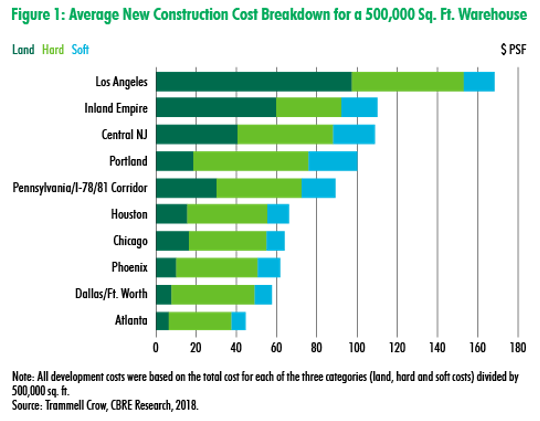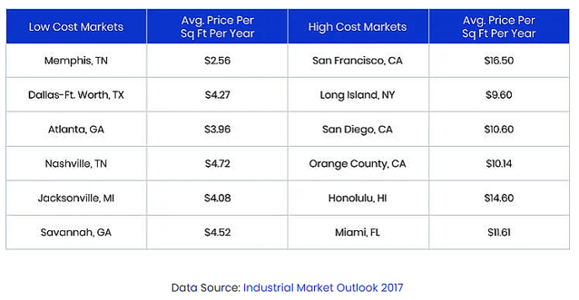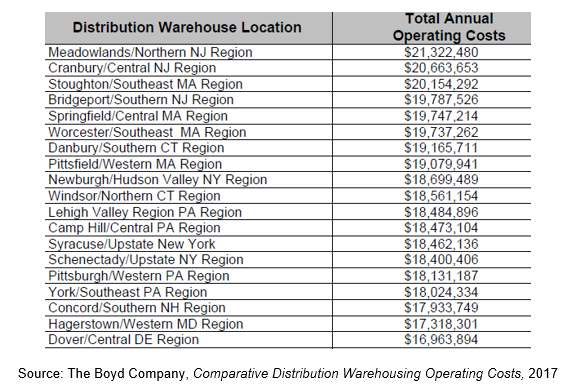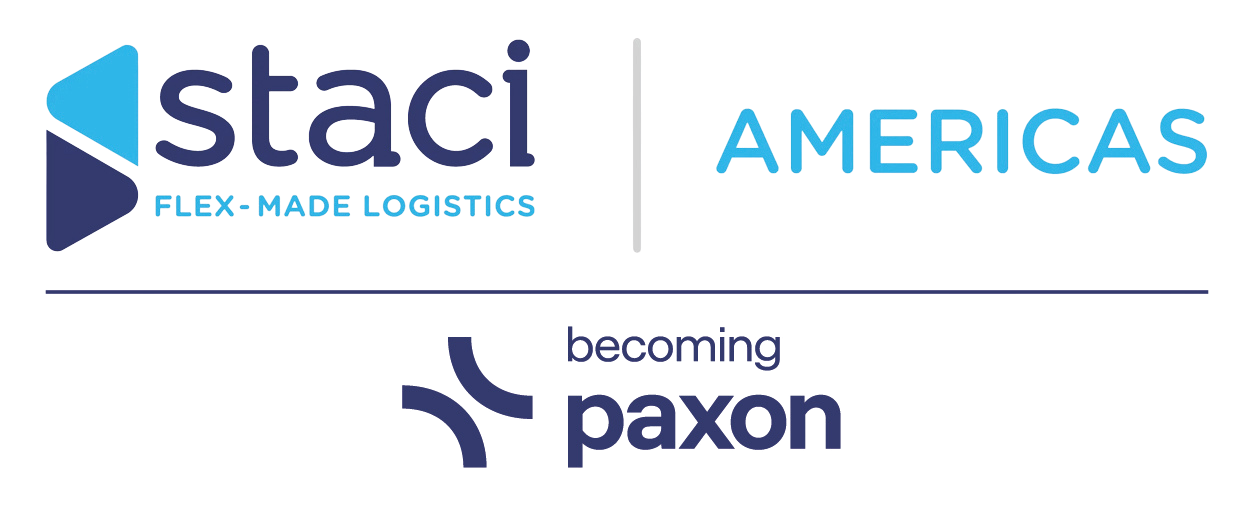Share this
The Cost of Adding a Warehouse Fulfillment Center
by Staci Americas on Aug 27, 2020 10:00:00 AM
![]()
So you’re thinking about adding a fulfillment warehouse to your distribution network.
While there are plenty of good reasons to do so, locating inventory closer to your customers probably tops the list. You’ll not only be able to get products into their hands faster, you’ll also reduce your delivery costs.
Those are both critical considerations now that buyers have come to view free two-day shipping as their birthright. (Thank you, Amazon.)
Adding a warehouse also makes sense from the standpoint of business security.
If your inventory is centralized in one location, what happens if that facility goes up in flames? Or a pandemic (do we have those?) results in a prolonged business interruption?
Your insurance company may reimburse you for any physical losses. But will you be able to recoup your loss of customer loyalty, market share and brand reputation?
Okay, so it’s settled. You’ve decided you definitely want to expand your distribution network. In which case, your next question is probably…
How Much Will it Cost to Add a Warehouse Fulfillment Center?
The short answer is, it depends. There are lots of variables to take into account, including the location you choose, how much space you need and whether you want to build, buy or rent a facility.
Construction and real estate costs can vary widely by region (see charts below). You’ll need to analyze which locations position you to reach the largest percentage of your buyers in one or two days, while also being affordable.


As part of that analysis, you need to take into account not just the price of the building itself, but associated costs like interest, depreciation, maintenance, repairs, property and liability insurance, and property and sales taxes.
Next, you have to buy or lease all the stuff that goes inside the building to turn it into a working order fulfillment center. You know, stuff like:
- Heating and cooling equipment
- Security, fire suppression, telecommunications and lighting systems
- Racks/shelving, forklifts, rolling ladders, pallets, scales, boxes and other equipment and shipping supplies
- Automated retrieval systems and conveyors
- Servers, barcode scanners, mobile computers and warehouse management software to enter, track and store your inventory data
- Office equipment and supplies
Then there’s staffing – usually the largest portion of costs within a warehouse fulfillment center. Personnel costs include recruiting, hiring and training; wages and overtime; vacation and sick pay; life and health insurance, and pensions.
Finally, don’t forget about inventory. Stocking your new warehouse isn’t just a simple case of splitting what you currently have between two locations. You’ll need buffer stock at each location, as well.
Like building costs, annual operational expenses will differ by region. The chart below shows how widely costs for a 500,000-square-foot, 250-worker distribution warehouse can vary just within the Northeastern US. Costs in the Southeast, Midwest and some far Western states may be lower, while major West Coast locations – especially California – will be higher.

A Better Option: Outsource Instead
If this discussion is making you rethink your decision to add a warehouse fulfillment center, let us offer you another option. Instead of doing it yourself, partner with a nationwide third-party logistics (3PL) company that has already invested in the physical and systems infrastructure.
There are numerous advantages to working with a 3PL. Among the most compelling are:
- Preservation of working capital. You won’t have to tie up huge sums in long-term financing arrangements, and you won’t have to worry about updating or replacing expensive, specialized equipment or systems.
- Rapid scalability. You can expand into a new market in weeks versus months or more than a year if you decided to expand on your own.
- Variable pricing. A 3PL only charges you for the space and services you actually use, so your logistics costs parallel your revenue stream. If your business experiences a growth spurt or seasonal increase in volume, you won’t have to scramble to add space or personnel. Conversely, in a slower economy, you’re not locked into paying fixed costs for space, equipment and labor that you aren’t fully utilizing.
- Reduced parcel shipping rates. A 3PL has the volume and experience to negotiate the best discounts and pick-up times with all of the top carriers and transporters.
- Technology and experience. Companies working with a 3PL can benefit from the 3PL's experience and the access they have to the latest technologies.
- Freedom to focus on your business and customers. Fulfillment is a hands-on, labor-intensive process that requires specialized equipment, systems and skills. It’s not your core competency. Outsourcing to a 3PL lets you devote your time and attention to growing your business.
If you’re looking for a 3PL partner with the knowledge, systems and national fulfillment network to help your company grow profitably, contact Staci Americas. We offer omni-channel fulfillment services. And, with 11 warehouse fulfillment centers in six strategic markets, we can provide 1–2 day delivery to 98% of the US.
Share this
- Fulfillment Operations (72)
- Fulfillment Services (39)
- Parcel Shipping for eCommerce (16)
- Amware Fulfillment News (7)
- Top Fulfillment Locations (7)
- Fulfillment Automation (6)
- Warehouse KPI (6)
- Multi Channel Fulfillment (5)
- Direct Sales Fulfillment (3)
- Fulfillment Outsourcing (2)
- Marketing/Sales Literature Fulfillment (2)
- Outsourcing Fulfillment (2)
- Alternatives to Amazon FBA (1)
- Fulfillment News (1)
- Fulfillment for Direct Response (1)
- Innovation (1)
- International Fulfillment (1)
- eCommerce Parcel Shipping (1)
- February 2026 (2)
- January 2026 (4)
- December 2025 (3)
- November 2025 (3)
- October 2025 (5)
- September 2025 (3)
- August 2025 (4)
- July 2025 (2)
- June 2025 (3)
- May 2025 (4)
- April 2025 (4)
- March 2025 (4)
- February 2025 (4)
- January 2025 (4)
- December 2024 (4)
- November 2024 (3)
- October 2024 (2)
- September 2024 (1)
- August 2024 (1)
- January 2024 (1)
- December 2023 (2)
- November 2023 (4)
- October 2023 (5)
- September 2023 (6)
- August 2023 (6)
- July 2023 (5)
- June 2023 (10)
- May 2023 (6)
- April 2023 (6)
- March 2023 (11)
- February 2023 (9)
- January 2023 (7)
- December 2022 (3)
- November 2022 (1)
- October 2022 (3)
- September 2022 (1)
- August 2022 (3)
- July 2022 (1)
- June 2022 (3)
- May 2022 (4)
- April 2022 (1)
- March 2022 (3)
- February 2022 (2)
- January 2022 (1)
- November 2021 (2)
- October 2021 (1)
- September 2021 (4)
- August 2021 (2)
- July 2021 (1)
- May 2021 (3)
- April 2021 (2)
- March 2021 (1)
- February 2021 (1)
- December 2020 (1)
- November 2020 (5)
- October 2020 (2)
- September 2020 (2)
- August 2020 (1)
- July 2020 (4)
- May 2020 (1)
- April 2020 (2)
- March 2020 (1)
- February 2020 (1)
- January 2020 (1)
- October 2019 (1)
- June 2019 (1)
- January 2019 (1)
- November 2018 (1)
- October 2018 (1)
- August 2018 (1)
- June 2018 (1)
- March 2018 (1)
- February 2018 (1)
- December 2017 (1)
- September 2017 (1)
- May 2017 (1)
- April 2017 (1)
- January 2017 (1)
- August 2016 (1)
- June 2016 (1)
- January 1970 (2)

Comments (1)